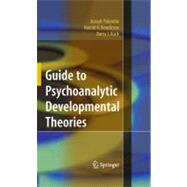Guide to Psychoanalytic Developmental Theories
, by Palombo, Joseph; Bendicsen, Harold K.; Koch, Barry J.- ISBN: 9780387884547 | 0387884548
- Cover: Hardcover
- Copyright: 5/26/2009
As the foundational theory of modern psychological practice, psychoanalysis and its attendant assumptions predominated well through most of the twentieth century. The influence of psychoanalytic theories of development was profound and still resonates in the thinking and practice of today's mental health professionals. Guide to Psychoanalytic Developmental Theories provides a succinct and reliable overview of what these theories are and where they came from. Ably combining theory, history, and biography it summarizes the theories of Freud and his successors against the broader evolution of analytic developmental theory itself, giving readers a deeper understanding of this history, and of their own theoretical stance and choices of interventions. Along the way, the authors discuss criteria for evaluating developmental theories, trace persistent methodological concerns, and shed intriguing light on what was considered normative child and adolescent behavior in earlier eras.Each major paradigm is represented by its most prominent figures such as Freud's drive theory, Erikson's life cycle theory, Bowlby's attachment theory, and Fonagy's neuropsychological attachment theory. For each, the Guide provides:biographical informationa conceptual frameworkcontributions to theorya clinical illustration or salient excerpt from their work.The Guide to Psychoanalytic Developmental Theories offers a foundational perspective for the graduate student in clinical or school psychology, counseling, or social work. Seasoned psychiatrists, analysts, and other clinical practitioners also may find it valuable to revisit these formative moments in the history of the field.






